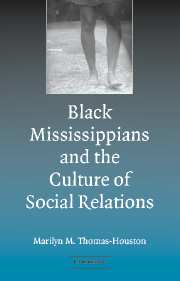Book contents
- Frontmatter
- Contents
- Preface
- Acknowledgments
- Introduction
- PART ONE THE CULTURAL HISTORY AND SOCIAL STRUCTURE OF THE REGION
- PART TWO SOCIAL CONSCIOUSNESS, SOCIAL ACTION
- PART THREE CONSTRUCTION OF AN INTRARACIAL IDENTITY
- Conclusion
- Appendix A Lafayette County Population Chart
- Appendix B Proclamation Honoring Ole Miss Demonstrators
- Appendix C Chancellor's Statement of Commendation
- Appendix D Speech by Susie Marshall for Second Baptist Church Honoring Rev. Blind Jim Ivy
- Appendix E Susie Marshall's Unpublished Draft of Freedman Town Marker Dedication Speech Recounting July 4, 1867, Speech of Oxford Ex-slave
- Bibliography
- Index
Appendix E - Susie Marshall's Unpublished Draft of Freedman Town Marker Dedication Speech Recounting July 4, 1867, Speech of Oxford Ex-slave
Published online by Cambridge University Press: 23 December 2009
- Frontmatter
- Contents
- Preface
- Acknowledgments
- Introduction
- PART ONE THE CULTURAL HISTORY AND SOCIAL STRUCTURE OF THE REGION
- PART TWO SOCIAL CONSCIOUSNESS, SOCIAL ACTION
- PART THREE CONSTRUCTION OF AN INTRARACIAL IDENTITY
- Conclusion
- Appendix A Lafayette County Population Chart
- Appendix B Proclamation Honoring Ole Miss Demonstrators
- Appendix C Chancellor's Statement of Commendation
- Appendix D Speech by Susie Marshall for Second Baptist Church Honoring Rev. Blind Jim Ivy
- Appendix E Susie Marshall's Unpublished Draft of Freedman Town Marker Dedication Speech Recounting July 4, 1867, Speech of Oxford Ex-slave
- Bibliography
- Index
Summary
Freemen Town 1869
We spend our lives as a tale that is told from word of mouth by our ancestors[;] nothing was recorded in the Oxford History of Lafayette County or Mississippi. After the Emancipation Proclamation was issued Jan. 3, 1863 hundreds of slaves were freed. These destitute people depended on the US Freedmen Bureau that made its appearance in Oxford December 27, 1866; a lieutenant of the union Army with a small band of troops to support him was responsible for furnishing food, clothing, shelter and security for 17,000 freedmen in Lafayette County during the period of 1865–1872.
Jim Nelson a colored man of about 35 years old was the principle] Marshall of the 4th of July Celebration 1867. He said with a low bow, my colored friends, we are all free now, as the white folks are. I don't know why I am free, nor who made me free. The Yankees said they did and I suppose it's so. (But the white folks are our friends.) We have known them all our lives, but who ever made us free I thank them, and we all thank them for it, although it made many of us a heap worse off than we were before. (The speech is taken from the Oxford Falcon July 13, 1867) of Oxford Historical Society after freedom was declared, the first flush of freed slaves continued to worship as they had in day of bondage in white churches.
- Type
- Chapter
- Information
- 'Stony the Road' to ChangeBlack Mississippians and the Culture of Social Relations, pp. 200 - 202Publisher: Cambridge University PressPrint publication year: 2004



